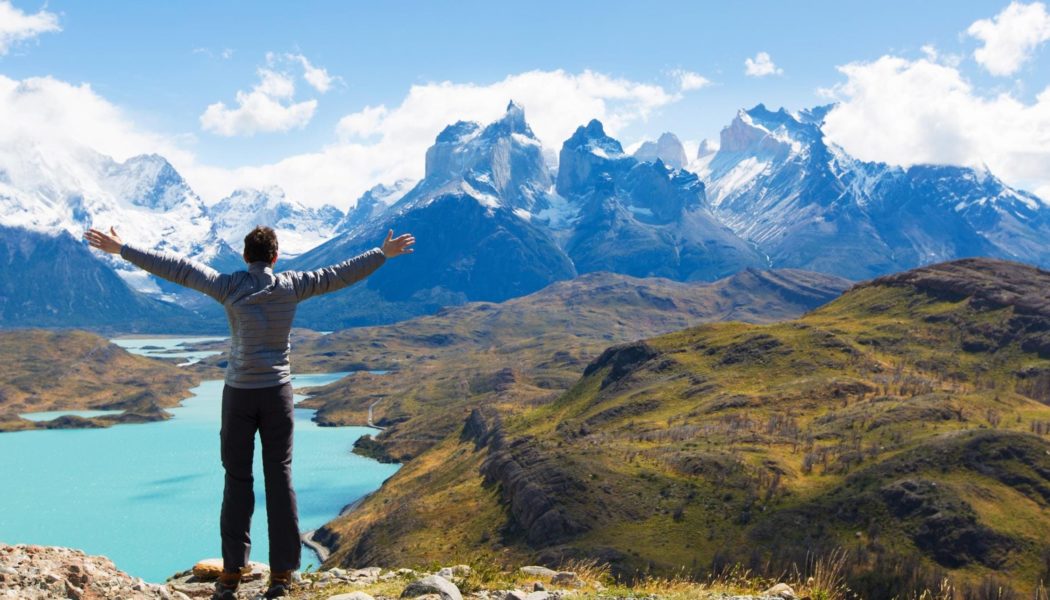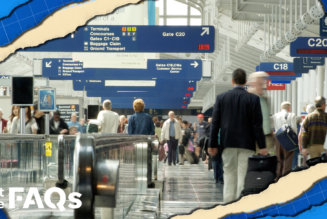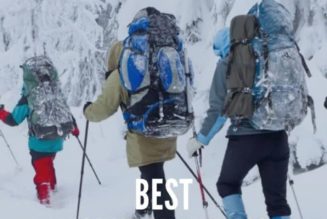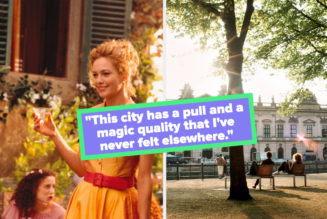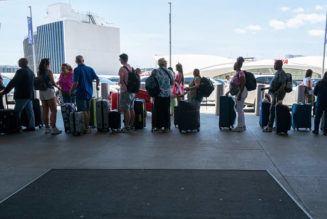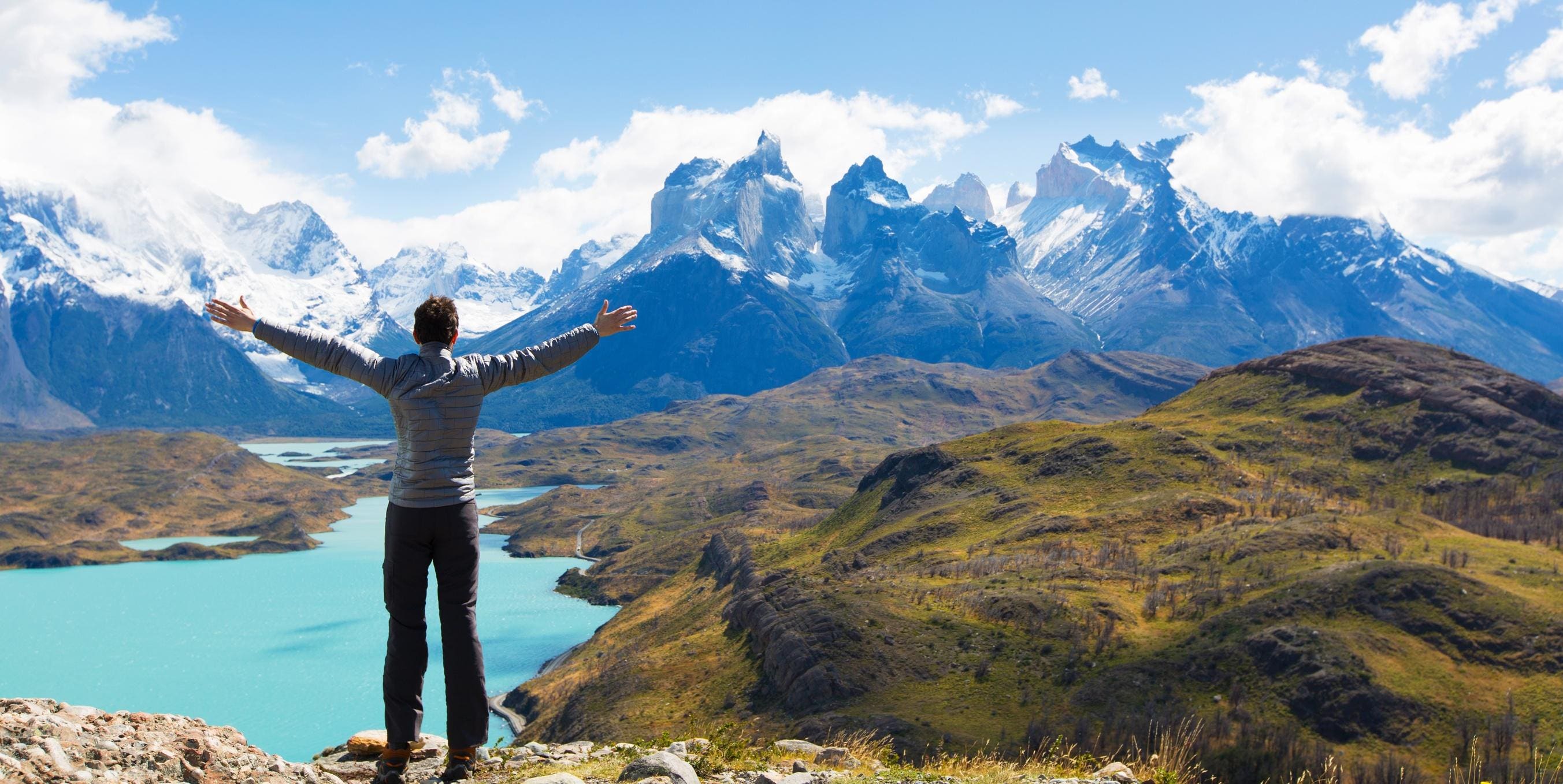
If you have a particular outdoor or travel passion, be it hiking, biking, golf or skiing, there’s a bucket list trip for you to experience this year. These are all options I have specialized in for three decades, and I continually try new outfitters and new destinations to find the best trips on earth—so I figured I’d kick off the New Year by sharing some of that expertise.
African Safari
There’s a lot to see in Africa, like these giraffe with Mt. Kilimanjaro, Africa’s highest peak, … [+]
I’m giving this one a lot of extra space, because to me this encapsulates the entire notion of a “Bucket List” trip—something that absolutely has to be done at least once in a lifetime, but ideally more than once. The other things on this list are interest-specific; if you don’t ski, you won’t care about the best ski trips. But the African safari is a life wonder for anyone, and while I have met many different people and many different kinds of travelers in my lifetime, I haven’t met one that would not be wowed by these trips. In terms of travel, it is simply a “must.”
For first timers, you can’t go wrong with the classics, East Africa (Kenya and Tanzania) or Southern Africa (South Africa, Botswana, Namibia, Zambia, Zimbabwe). But If I were choosing just one trip, it would South Africa and Botswana, a perfect combination. Having been on safari many times in ten different countries, I feel pretty strongly that Botswana has the best pure wildlife viewing experience, the most unique mix of ecosystems and some of the very best—and most legitimately sustainable—luxury lodges. In particular, Great Plains Conservation (which also has amazing lodges in East Africa), a hyper-sustainability focused operator whose founder and president is a famed National Geographic documentary filmmaker, has three of the very best places you can go on safari here: Zarafa Camp, Duba Plains Camp and the totally unique Sitatunga Private Island camp. I’ve had the good fortune to stay at many of the most famous and highly regarded luxury safari lodges across the continent, but Zarafa is the only one I named one of my dogs after, because it is that amazing.
Note: I had already finished this draft and was ready to publish when the UK’s Telegraph released its New Year’s Eve list of the 20 Destinations to Visit in 2024. Botswana’s Okavango Delta was the only location in Africa, and the author noted, “Take it from me, if you haven’t been to Botswana, you haven’t yet expired the ultimate southern Africa safari. This is the year to change that—after all, it isn’t going to get any cheaper and the camps are better than ever.”
Botswana offers all the great African wildife you could want to see, plus the Okavango Delta, the … [+]
South Africa adds more best-in-class safari camps, the latest and greatest of which is the over-the-top single-party Cheetah Plains, along with a bevy of awesome beyond (or before) safari experiences: wine country, beaches, world class golf, the amazing city of Cape Town, the Cape Peninsula, luxury trains, stellar cuisine and the Cradle of Humankind UNESCO site.
Go with: This one is a no-brainer. Micato Safaris is not just the best safari tour operator, they are the best luxury company I have experienced in any niche of travel, and I’ve experienced a lot of these. They are a 10-time winner of Best Safari Company from Travel + Leisure magazine, the only 10-time winner in any travel category, and they have accumulated a slew of other awards. But most importantly, they make miracles happen on a regular basis, and everyone in the safari industry wants to do business with them and goes out of the way to accommodate their clients. Safaris are all about access, and when you book through Micato, you have the best chance of getting space at the tiny lodges, the best rooms, guides and rangers, and insider access to museums, paleontology sites, city restaurants, art galleries, scientists, you name it. Unlike many operators who subcontract many elements, they have their own vehicle fleets, multiple offices in Africa and India (and the U.S.) and their guides have been with them for years. The first Micato guide I ever traveled with in Kenya in the early ‘90s (who was excellent) still guides for them, and so does a longtime South Africa guide I’ve traveled with who also took Oprah Winfrey around.
Great Plains Conservation runs some of the finest – and most environmentally friendly – luxury … [+]
I just planned another trip to Southern Africa for 2024 and once I involved Micato, a room at a “sold out” lodge I wanted to visit miraculously appeared. Between detailed expertise on every camp, bush plane flights you can’t book yourself, and a dozen other logistically challenging moving parts behind the scenes, there is no form of travel as dependent on using an expert as safaris—don’t even consider trying to do it yourself. Who you choose to plan your trip may well be the most important decision you make, and if you can afford a luxury African (or Indian tiger) safari, you can’t afford not to go with Micato.
Skiing—Japan
Nagano is famous for its hot spings and onsen baths, and even the famous local snow monkeys enjoy … [+]
Just a few years ago when I heralded the deep, fluffy powder of this island nation, many people replied, “There’s skiing in Japan?”—despite the fact that they have held the Winter Olympic Games twice, in two different regions. Now the secret is out of the bag, and most skiers and snowboarders know Japan is the trip of a lifetime. The main reason is that it gets more snow than any other place on earth, so much that it boggles the mind, and it’s the kind of light, dry powder you go heli-skiing for. But Japan is also arguably the best food nation on earth, has fantastic hospitality, is incredibly safe and offers a compelling cultural immersion off the slopes. Surprisingly to many, it is also a good value, cheaper than most Rocky Mountain resorts. All these elements combine to make it the dream ski trip, and because of its newfound popularity, there are lots of new hotels and infrastructure. The two main regions to choose for are Nagano, on Japan’s main island, accessible by train or shuttle bus from Tokyo, and Hokkaido, Japan’s northernmost island, anchored by the city of Sapporo. Hokkaido gets slightly more snow, so it has gotten all the media attention, but there’s still way more powder in Nagano than most skiers can dream of, and with fewer Western visitors, it lasts a lot longer (locals generally prefer groomed trails).
I’ve been to Japan several times, and think the Nagano experience is much more culturally authentic, with small towns, ryokan lodging, lots of onsen hot springs bathing, almost exclusively Japanese cuisine, and the chance to see the famous bathing snow monkeys. It takes more work because you have to move between multiple smaller resorts, while the language challenge and culture shock is even greater. Hokkaido is far more popular with Americans, Canadians and Australians, is much more Westernized (tacos and burgers can be easier to find than Japanese food) and has the nation’s most popular large resorts, each of which is a destination in and of itself—most notably Niseko, Japan’s most popular (and famous) resort. For one-stop, turnkey planning, it’s easier, and for luxury travelers, has the best hotels, especially brand-new additions such as the Ritz-Carlton Reserve and Park Hyatt, both at Niseko.
Japan gets more powder than any ski destination in the world, so much that its nickname is “Japow!”
Go with: To dive deep culturally and explore the nuances of Nagano, I’d rely on the expertise of Scout Ski, an Australia-based but global bespoke ski travel planning company specializing in this kind of behind-the-scenes local knowledge. Scout covers Europe and North American ski destinations too, but really pioneered sending foreigners to Nagano. For Niseko and the one-stop luxury shopping approach, try Alpine Adventures, America’s foremost ski travel specialist and a full-service travel agency, which means they are great at finding good air fares and such. Alpine Adventures has really embraced Hokkaido and has emerged over the past few years as this country’s leading Japan ski expert. They are also a member of the elite Virtuoso network, which gets customers additional benefits.
Road Cycling—Tuscany
Who would not want to ride a bike in this landscape?
There are many great places to do guided cycling trips these days, including emerging hotspots like Mallorca, Croatia and South Africa, in addition to time-tested classics such as Burgundy, Napa/Sonoma and just about every region of Italy. But for avid cyclists, Tuscany has always been the dream and remains so, with great food, beautiful countryside, world-class vineyards and so many charming towns. You could go over and over again without retracting your steps.
It has also emerged as the global dream destination for gravel grinding, the fastest growing cycling niche, a subset of road biking focused on unpaved back roads that tend to be largely traffic-free. Hundreds of miles of famed “white roads,” due to the color of the local gravel, run through Tuscany, immediately transporting cyclists a world away from the heavily touristic region. But even with the tourists and even on paved roads, Italian drivers remain polite and safety-minded when it comes to bikers, a refreshing change from much of the world. When you take the landscape, the olives, the grapes, the wines, the cheese, the towns, the food and the gateway city of Florence, you cannot beat Tuscany, on and off the bike.
In additon to its world famous paved road biking, Tuscany offers hundreds of miles of gravel … [+]
Go with: There are a number of excellent choices when it comes to luxury guided cycling trips, but the gold standard remains Butterfield & Robinson, the company that literally invented this category of luxury active travel back in 1966. Tuscany has always been a marquee trip for the company, and they have been doing it longer than any of their competitors, with expert guides and long-term relationships that can give them access to lodging and dining that they have locked up for many years. One other specialty B&R is known for is its off-the-bike VIP experiences, from visiting closed museums to wineries, olive oil and cheese producers not normally open to the public, and again, their decades of personal relationship here really help with this. They offer several ways to bike Tuscany, from their more affordable but still excellent (I’ve done it) self-guided product to their 6-Day Tuscany Wine Country scheduled trip to their flagship 6-Day Super Tuscan deluxe itinerary…as well as private custom trips. If gravel grinding is your thing, DuVine, another top guided operator, is the only one in this upscale tier offering scheduled Tuscan White Road gravel trips. I’ve traveled with both companies and can highly recommend them.
Hiking—Tour Du Mont Blanc
The tallest peak in the Alps, Mont Blanc is a hiker’s paradise.
There are regions where you can do lots of great day hikes, and long-distance hiking trails like the Appalachian or Pacific Crest that take months to complete, but in the middle are multi-day-long distance hikes of five to 12 days, doable as a vacation rather than a sabbatical. In this category, the Tour du Mont Blanc is simply amazing. It circumnavigates the highest peak in the Alps, Mont Blanc, which in turn straddles the Swiss, French and Italian borders—three ultra-desirable hiking countries in one trip. You climb mountain passes and traverse the valleys in between for 8-12 days (these are the most common itineraries), so you get a literal taste of three distinct alpine cuisines, from gelato in Italy’s charming ski town of Courmayeur to fondue in Switzerland to tartiflette in France. The scenery is just amazing, the trails look like what you would imagine if you closed your eyes and pictured the most stereotypically iconic mountain footpaths, and the trips typically begin and end in Chamonix, the world’s greatest mountain town.
It’s fairly strenuous, and unlike guided bike trips you can’t just step to the side of a trail and jump in a support van when you get tired, so you have to be a hiker to do it. The good news is that there are still extensions, shortcuts and daily options of different lengths, and luxury tour operators provide shuttle service from trailheads to better hotels in towns, so you rest well, eat well and even shop well along the way. Hiking the TMB, as it is known, is one of the very best active trips I have ever done of any kind, and while I usually don’t like to repeat these kind of vacations because there is always something new to see, this is one I would gladly do again.
Did I mention fondue?
Go with: The operator I went with, National Geographic Expeditions, was excellent, but they no longer do it. Of the many guided companies that offer the TMB, my pick would be Mt Sobek, one of the longest established and most highly regarded outdoor adventure companies. Their itineraries feature better hotels, and they offer both a 12-day version that does the full traditional 99-mile loop and an 8-day “express” version. If you are on a budget but need to knock the TMB off your Bucket List, G Adventures is a reliable active travel specialist that offers does a lot of these trips using basic accommodations and less included meals, but for a price that cannot be beat (from $2,249 per person for 10-days).
Golf—British Isles
St Andrews’ Old Course, the birthplace of golf and golf travel’s Holy Grail.
This is a tough one because true links golf is the best kind of golf in the world, and there is so much world-class links golf here, with drop-dead courses tucked into every corner of the British Isles from Wales to the Outer Hebrides to Northern Ireland. But basically, if you want the classic Bucket List and have not been to St. Andrews, the Birthplace of Golf, the Old Course is the main event, not because it’s the best links (its great, but it’s not) but because it is golf’s holiest real estate, a magical town with magic in the air, and a dozen-plus other standout courses surround the Old. If you have played it, or can live without it, I’d put Ireland ahead of Scotland for a dream golf trip. This is something fans will argue endlessly about, but my theory is they both have too many great courses to play in a single visit, mixing World Top 10, 50 and 100 ranked legends and hidden gems, but Ireland has the edge when it comes to natural beauty, weather, luxury lodging, culinary, and overall hospitality. But if you love golf, a trip to the great links courses of Scotland or Ireland (or Wales or England) is the stuff once-in-a-lifetime dreams are made of.
Ireland and Northern Ireland have more than their fair share of great links courses, like British … [+]
Go with: There are a lot of good operators for these classics, and especially to book the top courses such as The Old, Muirfield, Royal County Down, Ballybunion, and such, you’ll need to use a good tour operator. I like Haversham & Baker and Perry Golf, both of which I have had great experiences with and both of which really know these regions, but that’s not to say there are not several other good choices.
Multi-Sport—Explora Lodges, Chile and Beyond
The most iconic Explora property is the original flagship in Torres del Paine National Park in … [+]
Muti-sport adventures have boomed in popularity because they offer more varied experiences, often something new even to the experienced active traveler, and they don’t lock you into one box in terms of passion. These typically combine cycling, hiking and one to two other pursuits, most commonly sea kayaking, but occasionally white-water rafting, caving, horseback riding, snorkeling, glacier walks, via feratta “climbing,” ziplines, and more, often including options such as yoga. All of the top luxury active travel companies, especially Butterfield & Robinson (“multi-active”), Backroads (“multi-adventure”) and DuVine (“Bike-plus”), all of whom I have traveled with and are exceptional, offer a slew of these, in places like Costa Rica, Iceland, Alaska, Morocco, the Dolomites and many more.
But to me the best way to do multi-sport is to immerse yourself at an all-inclusive adventure lodge in one of the world’s great outdoor destinations, and no one does this model better than Chile’s Explora, a family-owned hospitality business created out of national pride, to showcase the beauty, activities, food and wine this country offers, which traverse just about every ecosystem (Explora has also expanded into Peru, Argentina and Bolivia, and offers combination trips between its lodges).
Explora’s model is simple: it operates luxury lodges that are truly built and managed for sustainability, not the faux eco-friendly greenwashing many resorts claim. These are boutique and all-inclusive, with great food and free flowing Chilean and Argentinean wines. But most importantly, Explora employs all its own full-time, in-house expert local guides, while many resorts around the world subcontract these services out. They understand not just the activities and terrain, but local culture and history as well, for a deep dive immersion. Every lodge offers a huge menu of half day and full day activities, especially hiking, which is world class just about everywhere they operate, but also cycling, paddling and their signature equestrian offerings. Explora also operates its own stables and breeding, using especially well-suited Patagonia horses and this exemplifies their spirit of doing everything well and hands on, and doing it themselves. A couple of locations also have high-end stargazing, especially Atacama, home to the world’s largest research radio telescope, where they have a private professional domed observatory at the resort.
The driest place on earth, Chile’s Atacama desert is a perfect multi-sport destination.
Activities range from sedate to very active, and my wife and I were the only ones to sign up for a hike to the summit of 18,400-foot volcano in the Atacama Desert, which is pretty demanding day hike. I have been to three locations, Torres del Paine National Park in Patagonia, stunning hiking and glaciers, the Atacama Desert, the driest spot on earth and more like Mars, and Easter Island, home to the famous Moai statues and the single most interesting place I have traveled to on earth. They are all so good and so different I cannot recommend any one over the others, and my next one to visit will be Peru’s Sacred Valley, near Machu Picchu, full of ruins and great hiking. You can’t go wrong with Explora for locations, lodging, cuisine, or activities, all with a conservation ethos.
Mountain Biking—Dolomites
Endless mountain biking trails run through amazing scenery in Italy’s Dolomites.
I have spent a lot of time in mountains all around the world, from the Rockies to Himalayas to Andes, and I have never seen a more beautiful mountain landscape than Italy’s Dolomites, a geological example so unique it has been classified as a UNESCO World Heritage Site. Hiking and skiing here are exceptional as well, but the beauty of mountain biking is that the options are endless, and suitable for all abilities. You could spend a week on wide track jeep roads, you can tackle the gnarliest single track, and you can do it all by fully human power or e-bike.
The options include one of the world’s epic single day rides, the famed Sellaronda, a loop that climbs four high passes. You can do different day bike tours, or go town to town—fabulous towns—or valley to valley. Depending how you measure ski resorts, the Dolomiti Superski network of lifts and trails is either the first or second largest interconnected system in the world, and many of the lifts and gondolas run in summer too, creating an entire another level of MTB options for those who prefer not to do a ton of uphill. Basically, you cannot run out of options while in one of the most beautiful landscapes on earth, the region has the most extensive network of rifugios (mountain restaurants) in Europe, and the food in general is excellent, from hearty comfort dishes to Michelin stars. Similarly, the lodging runs the gamut from staying in rifugios to Realis & Chateaux luxury properties. Endless variations, none of them bad.
Go With: Surprisingly, given the number of high-end road bike tour operators in the market, no one has really done the same thing with mountain biking, and specialists for this tend to be highly regionalized local operators, Fortunately, there is just this here, Dolomite Mountains, an Italian company focused on all things Dolomites, skiing, hiking, biking and climbing. They do not have any scheduled MTB trips (they do for skiing and hiking) but they have several sample itineraries you can check out, and then they design and guide a trip just for you and your group, with excellent guides and at more reasonable prices than this kind of thing is in most other places, regardless what level of luxe you opt for. I’ve traveled with them multiple times, and I’d choose them again.
